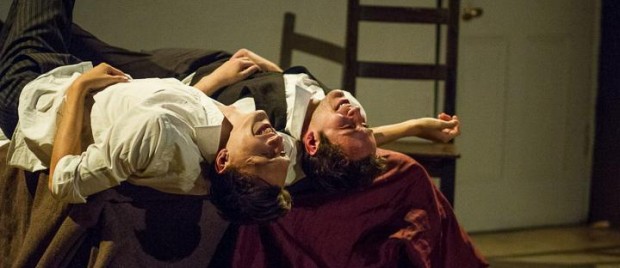You have no items in your cart. Want to get some nice things?
Go shopping
Isherwood went to Berlin in 1929 because, as his autobiography diagnoses, in its tinny third-person voice, “Christopher Isherwood was suffering from an inhibition… he couldn’t relax sexually with a member of his own class or nation.” This need for an erotic distance, a detachment from the homophobia invested in the middle-class and the nation—the expat, class traitor equivalent of turning the family photographs down while having sex—was “not unusual”. Wilde wrote of the illicit pleasures “feasting with panthers,” dallying with grooms and rentboys, and Edward Carpenter’s bucolic socialism was grounded in a conviction that same-sex love could be a “great leveller”. Isherwood’s craving for strangeness and his rejection of England and its “poshocracy” were stronger still: he deliberately flunked out of Cambridge and sought sex and adventure in Germany, among the people who killed his father, as his mother regularly reminded him.
We go to Berlin—to Isherwood’s Berlin, Metropolis of cabarets, self-aware degenerates and incipient catastrophe, and to our own, on EasyJet flights — in search of our own lavish strangeness. Jackinabox Productions intended to call their account of the most famous literary sex tourism Christopher and His Kind, after the source material, but after the last-minute intervention of the Isherwood estate, arrived on a more apt title: Berlin. Maybe if the promotional materials had harped on zeitgeist more—like the National Gallery shamelessly advertised Vienna 1900 for its exhibit of nearly a century of Habsburg portraiture—the crowds would have been thicker at The Space on Tuesday night. That sunken Berlin, pre-Machtergreifung and genocide, is really the draw here, and Isherwood just the vessel. And Berlin captures much of that zeitgeist’s cultic lure. The production is an earnest and energetic channelling of Weimar profligacy, seen by a British flâneur, and it thoroughly charmed away my Isherwood fatigue. (This is probably an unusual affliction.)
John Askew’s adaptation of Isherwood’s memoir is brisk and mobile, toggling between ensemble romps (including fun, if stage-y “numbers” at the Cosy Corner and Magnus Hirschfeld’s Institute for Sexual Research) and close moments. The best of these—Auden’s declaration of love, offered as a poem draft and returned with a correction of a prepositions, and our final glimpse of Jean Ross/Sally Bowles, yearning for a revolution as fascism towers—are restrained and devastating, close to magic.
The staging is agile and athletic, bracing the plot when it worked (Isherwood is literally swept into the Cosy Corner and into the arms of its boys) but distracting when it didn’t. Most effective were the renderings of sex—the erotic brawling of Isherwood’s tumbles with his strapping Germanic boys and the stretched mirrored movements of his encounter with the mother of a pupil, and the contrast between the two scenes. However, Anais Alvarado’s syncopated, almost mime-inspired movements as a waitress and the stylized CPR of a man beaten by the Nazis by a clown-shoed doctor seemed piped in from another show. The train chugs and hisses that trailed Isherwood to Berlin—calling to mind the spectacular approach to the city in Symphony of a Metropolis—was exhilarating, but drowned out some important dialogue.
Askew’s Isherwood is dynamic enough to carry a show and unassuming enough to be the audience’s stand-in: our shock, titillation and despair register on his face first. David William Bryan’s Auden is pickle-faced and prim, his faithful umbrella and constant whinging about the weather hints of his residual Englishness, his tetchy unwillingness to be drawn in as deep as Isherwood is. And by 1933, Isherwood is on over his head, in love with a German boy as the city he loves is crushed under an SA boot, its books burned, clubs shuttered, and “degenerates” imprisoned.
A decade earlier Isherwood and his childhood friend Edward Upward had conjured a macabre English village, Mortmere, settled by deviant vicars and general psychopaths and gripped by Lovecraftian horrors, narrated in stories with titles like The Leviathan of the Urinals. It was a satire and revocation of the English pastoral and of the Urians who sought their liberation here, in neo-Hellenism and green splendour. The annals of Mortmere are dogged by catastrophe, by malices machinist, bureaucratic, senseless: the wrecking of a train, Szilveszter Matuska-style, a metal burr on a road that rips a wheel and strands drivers at a gas station. These terrors were a rotten English harvest in Isherwood’s mind. He could never have imagined their fulfilment—clanking, rubber-stamped murder, with interchangeable parts—in Berlin and his flight from Germany was tinged with betrayal.
Unfortunately, Askew’s Berlin loses momentum after Isherwood flees and the coherence of the revolving roles and stripped stage crumbles. His increasingly desperate tour through Europe with Heinz and Auden quickly descends into confusion and requires a surreptitious cue card—announcing Amsterdam—to tell us where they are, but his final landing in America feels cathartic—his real escape from hidebound Europe and its wars and the one that stuck.
Berlin continues at The Space until July 5.





